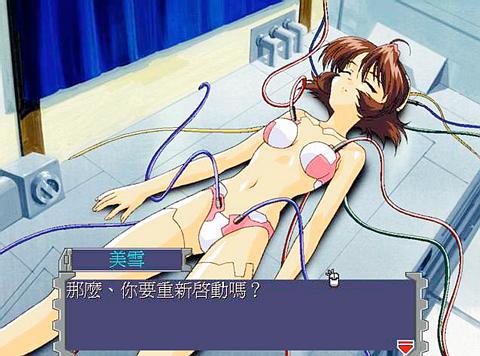Video games have always been a boys' thing, full of snakes, snails, spaceships, and smart bombs. But that was before the graphics were good enough to show women in bikinis and busty ninjas in high slit chipaos.
Still, most pay-per-play games are about fighting and blasting, even though they've come to include warriors with heaving bosoms. Yet in places like Taiwan, Japan and South Korea, it's PC games that have pushed into the really bizarre territory, mainly through their heavy emphasis on romantic role-playing and simulation.
New home play genres center on college coeds, teen idols, nurses, high school girls and even their little sisters. Designed mostly by men and mostly for men, these games account for about 35 percent to 40 percent of all computer game sales in Taiwan and can be found in nearly every 7-Eleven on the island.

As one may conjecture, "Most of these games are bought by male high school students," says Tsai, a gaming industry manager from Waei International Entertainment. "If you're a high school boy in Taiwan, there aren't so many chances to get a girlfriend. So maybe you buy a simulation."
Waei distributes Tokimeki Memorial (純愛手札) for Konami. The game is the most popular dating simulation ever made, with its latest version ranking number one in Japan -- and last year's offshoot, Sentimental Graffiti (青澀寶貝) a top seller in Taiwan.
Toki Memo, as the game is known to its thousands of fans, unfolds through the eyes of a male protagonist, who goes out with a dozen different female classmates during junior high and high school. His goal, naturally, is to get a girl to declare her undying devotion under the school's "spirit tree", as that act bestows eternal happiness and so forth. As in real life, the major influences on the boy's success includes factors both in his control (his silver-tongued cajolery, or as much as he can muster according to a multiple-choice interactive format) and factors such as astral compatibility and blood type.

Fancia, a child-rearing simulation for kids, is also handled by Waei. The game lets the player raise a cute albeit nudist "werekitten" -- she's more or less half cat and half nymphet -- through a series of "life" situations and cat shows. Though the earliest child-raising prototypes didn't anticipate it, simulations like Fancia have helped make inroads beyond boys. In some cases, up to 60 percent of sales are to from girls. "It's like playing house or playing with dolls," says Yuan Mei-lin, also of Waei.
Other games, however, are set up on much less innocent pretexts. Super Doctor (青澀寶貝), distributed locally by Gamebox, is a milder version of what is known as an H-games (the "H" is for "hentai", which is Japanese for "pervert"). Intended for adults only, the game posits the player as doctor, letting him disrobe female patients for examinations, treatments, and when the game gets pseudo-serious, operations.
What may be disturbing to some parents is that R-rated or X-rated Super Doctor sits on the same set of shelves with the G-rated Fancia in at least one major Taipei software outlet. At that same store, another adult romance -- which strands the player on a desert island with several comely and willing associates -- sits a few shelves away and is mixed in with some teen-oriented role playing games.

Such intermingling is possible in light of Taiwan's non-existent system for rating and restricting sale of video games. Administration should be the province of Taiwan's Government Information Office (GIO), though as one GIO official says, "we regulate television, movies, video, VCDs and DVDs, but we don't regulate computer games. We don't have anybody to do that. Pornography falls under the statutes of the criminal law. If someone breaks that, the police can prosecute them."
Since kids generally play computer games at home, alone, and on machines their parents don't understand, H-games have also managed to fly under the radar of most local parents' groups and media watchdogs. An exception is Taipei City Councilwoman Chen Hsueh-fen (陳雪芬) who, acutely aware of the phenomenon, declared that the games are having "a very serious negative influence on our children," especially since "anyone can buy them."
So at present, the companies themselves decide on how to deal with the "H" factor. Waei and others, like King's Multimedia International, say they are careful to control adult content, since they derive most of their sales from young gamers. Both companies even admit to having edited or refused certain games because of explicit content. Other distributors, like Gamebox, specialize in interactive porn.

Speaking of a simulated romance game he played at a friend's, Bobby Chang, a 25-year-old Chinese who was raised in Japan, says, "The way the girls speak in the games is just like how girls speak in porn videos. It's an incorrect stereotype of how girls are supposed to be, and I think it could be damaging to kids who play them."
Whether that happens or not, Chiang says the games will keep coming, getting more and more sophisticated with each release. Alluding to Toki Memo, she says: "In the next edition, you not only have to plan real travel time as you schedule dates with girls in different parts of Japan, like Okinawa or Hokkaido, but if they find out you're dating another girl, they'll dump you."


The canonical shot of an East Asian city is a night skyline studded with towering apartment and office buildings, bright with neon and plastic signage, a landscape of energy and modernity. Another classic image is the same city seen from above, in which identical apartment towers march across the city, spilling out over nearby geography, like stylized soldiers colonizing new territory in a board game. Densely populated dynamic conurbations of money, technological innovation and convenience, it is hard to see the cities of East Asia as what they truly are: necropolises. Why is this? The East Asian development model, with

Desperate dads meet in car parks to exchange packets; exhausted parents slip it into their kids’ drinks; families wait months for prescriptions buy it “off label.” But is it worth the risk? “The first time I gave him a gummy, I thought, ‘Oh my God, have I killed him?’ He just passed out in front of the TV. That never happens.” Jen remembers giving her son, David, six, melatonin to help him sleep. She got them from a friend, a pediatrician who gave them to her own child. “It was sort of hilarious. She had half a tub of gummies,

The wide-screen spectacle of Formula One gets a gleaming, rip-roaring workout in Joseph Kosinski’s F1, a fine-tuned machine of a movie that, in its most riveting racing scenes, approaches a kind of high-speed splendor. Kosinski, who last endeavored to put moviegoers in the seat of a fighter jet in Top Gun: Maverick, has moved to the open cockpits of Formula One with much the same affection, if not outright need, for speed. A lot of the same team is back. Jerry Bruckheimer produces. Ehren Kruger, a co-writer on Maverick, takes sole credit here. Hans Zimmer, a co-composer previously, supplies the thumping

There is an old British curse, “may you live in interesting times,” passed off as ancient Chinese wisdom to make it sound more exotic and profound. We are living in interesting times. From US President Donald Trump’s decision on American tariffs, to how the recalls will play out, to uncertainty about how events are evolving in China, we can do nothing more than wait with bated breath. At the cusp of potentially momentous change, it is a good time to take stock of the current state of Taiwan’s political parties. As things stand, all three major parties are struggling. For our examination of the